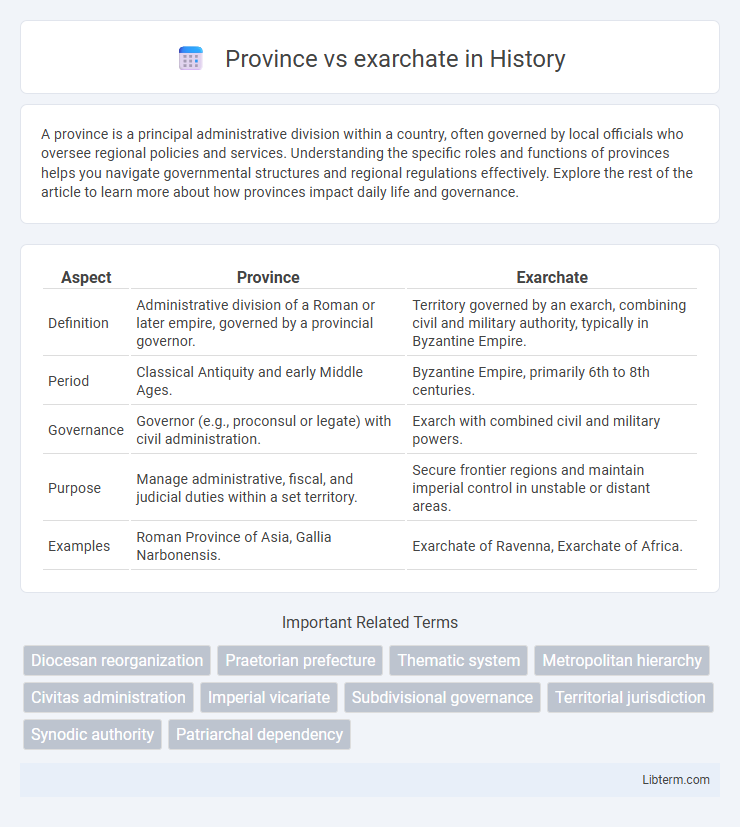A province is a principal administrative division within a country, often governed by local officials who oversee regional policies and services. Understanding the specific roles and functions of provinces helps you navigate governmental structures and regional regulations effectively. Explore the rest of the article to learn more about how provinces impact daily life and governance.
Table of Comparison
| Aspect | Province | Exarchate |
|---|---|---|
| Definition | Administrative division of a Roman or later empire, governed by a provincial governor. | Territory governed by an exarch, combining civil and military authority, typically in Byzantine Empire. |
| Period | Classical Antiquity and early Middle Ages. | Byzantine Empire, primarily 6th to 8th centuries. |
| Governance | Governor (e.g., proconsul or legate) with civil administration. | Exarch with combined civil and military powers. |
| Purpose | Manage administrative, fiscal, and judicial duties within a set territory. | Secure frontier regions and maintain imperial control in unstable or distant areas. |
| Examples | Roman Province of Asia, Gallia Narbonensis. | Exarchate of Ravenna, Exarchate of Africa. |
Understanding Provinces and Exarchates: Key Definitions
Provinces are ecclesiastical territories governed by a metropolitan bishop overseeing several dioceses, forming a structured regional church administrative unit. Exarchates represent distinct church jurisdictions often established in missionary regions or diasporas, led by an exarch who exercises authority similar to a bishop but with specific missionary or autonomous functions. These definitions highlight the hierarchical and functional distinctions vital for understanding church governance and territorial organization.
Historical Origins of Provinces and Exarchates
Provinces and exarchates originated as administrative divisions within the Roman and Byzantine Empires, designed to manage vast territories efficiently. Provinces served as primary units governed by officials called procurators or governors, mainly for civil administration and tax collection. Exarchates emerged later during the Byzantine period, combining military and civil authority under an exarch to address both defense and governance in frontier or contested regions.
Administrative Structures: Comparing Provinces and Exarchates
Provinces function as primary administrative units in many countries, governed by officials who oversee local implementation of national policies and resource management. Exarchates serve as specialized administrative districts within certain religious or historical contexts, often led by an exarch who holds both ecclesiastical and civil authority. The distinction lies in their scope and purpose, with provinces managing broad civil governance and exarchates focusing on autonomous religious or cultural administration.
Ecclesiastical Significance of Exarchates
Exarchates hold significant ecclesiastical authority, often governing regions that require direct oversight from a patriarch or higher church authority, unlike provinces which function as standard diocesan territories. Exarchates serve as critical administrative units in the Eastern Orthodox and Eastern Catholic Churches, facilitating governance over communities with unique liturgical traditions or geopolitical contexts. Their role includes maintaining doctrinal unity and pastoral care in areas lacking a fully established ecclesiastical hierarchy.
Political Functions of Provinces Through History
Provinces have historically served as key administrative units within empires, facilitating political control, resource management, and law enforcement over vast territories. Unlike exarchates, which combined civil and military authority under a single ruler to address frontier defense and centralized power challenges, provinces often operated under civilian governors with limited military roles, enabling more structured governance and local integration. The evolution of provinces reflects their critical political function in establishing imperial order, collecting taxes, and implementing imperial policies across diverse populations.
Geographic Scope: Provinces vs Exarchates
Provinces typically cover a broader geographic area and encompass multiple dioceses or local jurisdictions, serving as an administrative division within a church or governmental structure. Exarchates usually have a more specific or specialized geographic scope, often established in regions requiring direct oversight or missionary activity beyond the typical boundaries of provinces. The geographic scope of an exarchate is often more focused on emerging or transitional areas, unlike provinces that manage established, extensive territories.
Roles of Governors and Exarchs
Governors in a province primarily oversee civil administration, implementing national laws, managing public services, and ensuring regional security under the central government's authority. Exarchs govern exarchates with a dual role combining both civil and military powers, often in frontier regions, acting as representatives of imperial authority with extended autonomy. While governors focus on local governance within established provinces, exarchs maintain control over strategic territories requiring flexible and robust leadership.
Evolution and Modern Relevance
Provinces evolved as primary administrative divisions in ancient Roman governance, organizing territories for civil, military, and economic control, while exarchates emerged later as semi-autonomous regions combining civil and military authority to address external threats more effectively. The exarchate system, exemplified by the Byzantine Empire's Exarchate of Ravenna, represented a strategic adaptation to decentralize power and enhance regional defense amid political fragmentation. Modern relevance lies in the historical influence of exarchates on contemporary administrative divisions that blend civil and military oversight, reflecting evolving governance models in response to complex territorial management challenges.
Notable Examples: Famous Provinces and Exarchates
The Roman Province of Asia, encompassing much of western Anatolia, stood as one of the empire's wealthiest and most administratively significant provinces, while the Byzantine Exarchate of Ravenna served as a crucial military and political center in Italy during the 6th to 8th centuries. Notable exarchates, such as the Exarchate of Africa, played key roles in maintaining Byzantine influence in North Africa after the fall of the Western Roman Empire. These examples highlight how provinces functioned primarily as administrative regions, whereas exarchates combined civil and military authority to address strategic frontier challenges.
Province vs Exarchate: Core Differences and Similarities
A province typically functions as a fully autonomous administrative division with a local government structure, whereas an exarchate is a territorial jurisdiction in the Eastern Orthodox and Eastern Catholic Churches governed by an exarch, often with delegated authority from a higher ecclesiastical power. Provinces usually represent secular divisions within a country, focusing on civil governance, while exarchates serve ecclesiastical purposes, managing religious communities across diverse regions. Both entities maintain hierarchical organization and territorial management but differ fundamentally in their roles--civil administration versus ecclesiastical oversight.
Province Infographic

 libterm.com
libterm.com